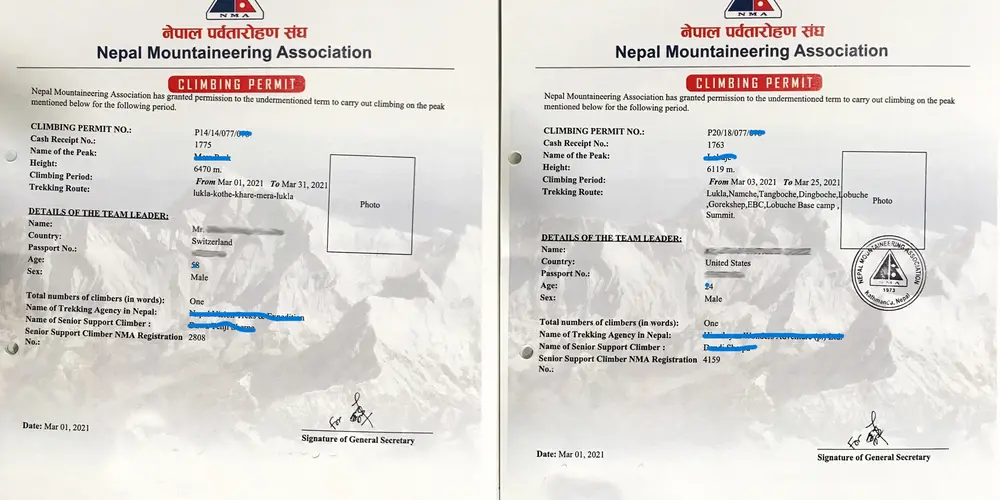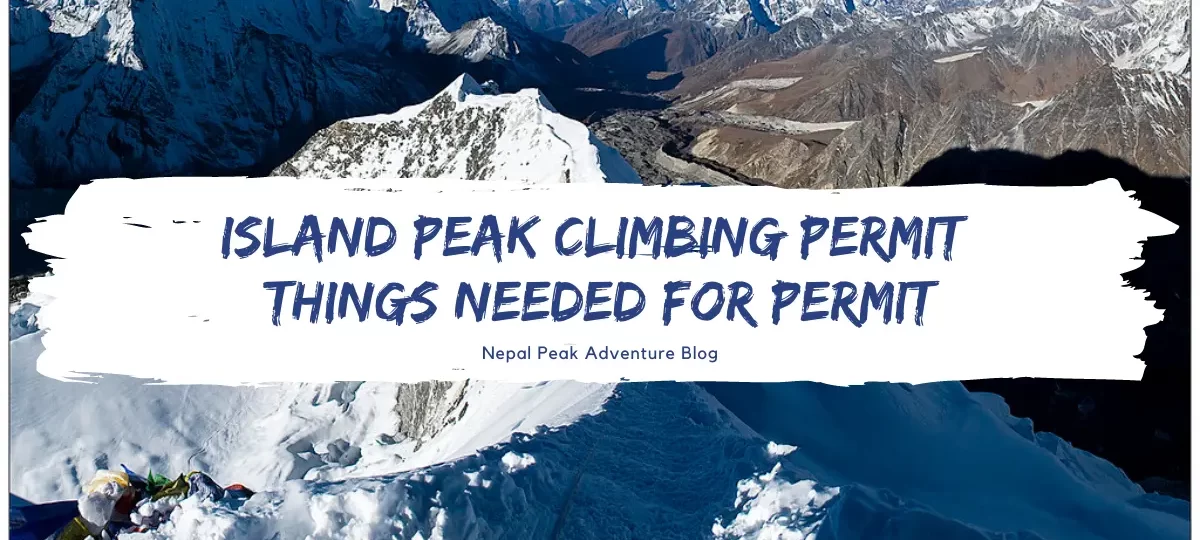Island Peak Climbing Permit: Things Needed for Permit
Acquiring an Island Peak Climbing permit involves a straightforward yet important application process. To ensure a smooth experience, it’s essential to understand the steps involved in obtaining the necessary permits. Here’s a breakdown of the Island Peak permit application process:
Table of Contents
Required Documents For Island Peak Climbing Permit
Gather the Necessary Documents for a Successful Island Peak Climbing Permit Application

To obtain a climbing permit for Island Peak, there are certain documents you must prepare. Ensuring you have the required paperwork ready beforehand will streamline the application process. Here are the essential documents you’ll need:
Passport-Sized Photos:
- To apply for the Island Peak climbing permit, you’ll need a few passport-sized photos. Make sure they meet the specified size and format requirements.
Photocopy of Your Passport:
- Along with the original copy of your passport, you’ll need a photocopy as well. The passport should be valid for at least six months from the time of your trip.
Nepali Currency (NPR) for Permit Payment:
- To pay for the climbing permit, you’ll need to have Nepali currency (NPR) on hand. Make sure to have the required amount ready, considering the permit cost and any additional fees.
Application Forms:
- You will be required to fill out specific application forms provided by the Nepal Mountaineering Association (NMA). These forms gather important details about your climbing expedition.
Travel Insurance:
Climbing in the Himalayas involves inherent risks, so it’s crucial to have appropriate insurance coverage. For foreign climbers, the following insurance policies are required:
- Accidental Insurance: Coverage of at least NPR 15 lakh (or equivalent in your currency) in case of accidents.
- Medical Insurance: Coverage of at least NPR 4 lakh (or equivalent) for medical expenses.
- Rescue Insurance for Climbing Guide: Insurance coverage to ensure the safety and evacuation of the climbing guide.
- (Note: Nepali climbers are also required to have the same insurance coverage of NPR 15 lakh for accidental insurance, NPR 4 lakh for medical insurance, and rescue insurance.)
- It is mandatory to have travel insurance that includes coverage for helicopter evacuation. This insurance ensures your safety during the climb and provides financial protection in case of emergencies.
Remember, having these documents prepared in advance will save you time and ensure a smooth permit application process. Also, here is a small insight into the Island Peak Climbing Difficulty.
Island Peak Climbing Permit Cost
Understanding the Cost of Obtaining an Island Peak Climbing Permit
Before embarking on your Island Peak adventure, it’s crucial to familiarize yourself with the cost associated with obtaining a climbing permit. The permit fees vary based on several factors, including the seasons and the governing body involved.

NMA Permit:
The Island Peak climbing permit is issued by the Nepal Mountaineering Association (NMA). The cost of this permit varies depending on the season you plan to climb:
- Spring (March to May): USD 250 per person
- Autumn (September to November): USD 125 per person
- Winter (December to February): USD 70 per person
- Summer (June to August): USD 70 per person
Garbage Deposit:
In addition to the climbing permit cost, climbers are required to pay a refundable garbage deposit of USD 500 to the NMA. This deposit ensures responsible waste management and is refunded upon completing the climb.
For garbage transfer, the following documents are required:
- Request Application from Agency: A formal application from your agency requesting garbage transfer.
- Original Receipt of Garbage Deposit: The receipt provided by the Nepal Mountaineering Association (NMA) as proof of the garbage deposit.
- Garbage Clearance Letter: A clearance letter from the Sagarmatha Pollution Control Committee (SPCC) or authorized personnel indicating proper disposal of the garbage.
It’s important to plan your budget accordingly, considering the climbing permit cost and the additional deposit. Be aware of the peak seasons when the permit cost is higher, and factor in these expenses when planning your Island Peak climbing journey.
How to obtain Local Area Permit in Khumbu
Obtaining the Local Area Permit for Island Peak Climbing
As you embark on your trek to Island Peak, you will need to acquire a local area permit, specifically known as the Khumbu Rural Municipality Entrance permit. This permit allows you to access the trekking route and various municipalities in the Sagarmatha region. Here’s what you need to know:
- Where to Obtain: The local area permit can only be obtained once you arrive in the Sagarmatha region, particularly in Lukla. It is not available in Kathmandu or any other location outside the Sagarmatha region.
- Cost: The local area permit fee is USD 20 per person. This fee helps support the maintenance and development of the local area infrastructure.
If you are interested in choosing the right time, then we have a guide about “Best time to climb Island Peak” too.
Understanding the Island Peak Climbing Regulations
To ensure a safe and responsible climbing experience, it’s crucial to have a comprehensive understanding of the Island Peak climbing regulations. Familiarize yourself with the following key aspects:
Permission and Duration
Climbing Island Peak requires obtaining permission from the Nepal Mountaineering Association (NMA). The permission is granted for a period of one month, with the possibility of a two-week extension if necessary. Remember, the permission period applies only to climbing activities above the base camp.
Climbing Fee and Refund Policy
Island Peak climbing involves a fee structure determined by NMA. The payment includes the climbing permit fee and garbage deposit. However, please note that the fees are non-refundable in the event of cancellation or expedition failure.
Accompaniment and Sirdar/Guide Responsibilities
Every climbing party must be accompanied by a registered Sirdar/Guide provided by NMA. The Sirdar/Guide plays a crucial role in assisting the climbing party, recruiting porters, ensuring compliance with permit terms, and facilitating waste management.
Environmental Protection
The Island Peak climbing regulations emphasize the protection of the environment. It is mandatory to leave the base camp and other camps clean and free of foreign materials. Proper disposal of waste materials is essential to maintain the pristine beauty of the region.
Essential Steps to Acquire Island Peak Climbing Permits
Obtaining climbing permits for Island Peak requires careful planning and adherence to specific steps. Here are the essential steps to acquire Island Peak climbing permits:
Step 1 – Research and Preparation
Before initiating the permit acquisition process, conduct a thorough research about Island Peak, including its location, altitude, weather conditions, and technical requirements. Prepare yourself physically and mentally for the climb.
Step 2 – Liaise with a Reputable Agency
Contact a reputable trekking agency like us “Nepal Peak Adventure” that can assist you in acquiring the Island Peak climbing permits. They will guide you through the process, provide the necessary information, and ensure compliance with the regulations.
Step 3 – Document Preparation
Gather all the required documents for the permit application, including a completed application form, passport-sized photos, a photocopy of your passport, and details of your travel insurance. Ensure that all documents are accurate and up to date.
Step 4 – Compliance with Regulations
Ensure that you understand and comply with the Island Peak climbing regulations set by the NMA. Familiarize yourself with the dos and don’ts, respect the environment, and follow the guidelines for a safe and responsible climbing experience.
Island Peak Climbing Permit: Dos and Don’ts
When obtaining an Island Peak climbing permit, it is crucial to be aware of the dos and don’ts to ensure a successful and responsible climb. Here are some key points to keep in mind:
Do’s
- Do apply for the climbing permit well in advance to secure your spot and allow for ample preparation time.
- Do the research and train adequately for the physical and technical challenges of climbing Island Peak.
- Do respect the local culture, traditions, and customs of the region during your expedition.
- Do follow the guidance and instructions of your registered Sirdar/Guide provided by the NMA.
- Do adhere to the designated routes and avoid straying from the specified climbing paths.
- Do prioritize the proper disposal of waste materials and follow eco-friendly practices to protect the environment.
Don’ts
- Don’t engage in any activities that could harm the environment or wildlife.
- Don’t litter or leave any foreign materials, such as fixed ropes or pitons, on the mountain.
- Don’t attempt to climb without a registered Sirdar/Guide provided by the NMA.
- Don’t disregard the climbing regulations and guidelines established by the NMA.
- Don’t exceed the prescribed time limits on the mountain as per your permit.
- Don’t engage in any behavior that is disrespectful to the local communities or fellow climbers.
Island Peak Climbing: FAQs
Q: What permits are required for climbing Island Peak?
A: To climb Island Peak, you need to obtain three permits: the Nepal Mountaineering Association (NMA) Permit, Sagarmatha National Park Entry Fee, and the Local Area Permit/ Pasang Lhamu Rural Municipality permit.
Q: How do I obtain the Island Peak climbing permits?
A: You can obtain the Island Peak climbing permits by contacting a government-registered local trekking agency, such as Himalayan Trekkers. They will help you with the permit process and collect the permits on your behalf.
Q: What documents are required to apply for Island Peak climbing permits?
A: The necessary documents for Island Peak climbing permits include passport-sized photographs, a photocopy of your passport, a duly filled application form, travel insurance (including helicopter evacuation coverage), Nepali currency for permit payment, confirmation of return flight, and a confirmed travel plan.
Q: How much does the Island Peak climbing permit cost?
A: The cost of Island Peak climbing permits varies depending on the season. The NMA Permit cost ranges from USD 70 to USD 250 per person, while the Local Area Permit fee is USD 20 per person.
Q: What is the purpose of the Garbage Deposit for Island Peak climbing?
A: The Garbage Deposit, which is an additional fee of USD 500, is collected by the Nepal Mountaineering Association (NMA) to ensure proper disposal of garbage during the climb. The deposit is fully refundable upon completing the trip.
Q: When is the best time to climb Island Peak?
A: The best time to climb Island Peak is during the spring (March to May) and autumn (September to November) seasons. These months offer favorable weather conditions and clear skies for a successful climb.
Q: Can I obtain the Local Area Permit for Island Peak in Kathmandu?
A: No, the Local Area Permit, also known as the Khumbu Rural Municipality Entrance permit, can only be obtained once you reach the Sagarmatha region, specifically in Lukla. It is not applicable in Kathmandu or any other place outside the Sagarmatha region.
Q: Are there any suggested itineraries for trekking to Island Peak?
A: Yes, there are three suggested itineraries for trekking to Island Peak. These include a 14-day Island Peak Climbing itinerary, a 4-day expedition from Chhukung, and a 19-day trek combining Island Peak and Everest Base Camp visits.
Q: Who can I contact for more information and assistance regarding Island Peak climbing permits?
A: You can contact Nepal Peak Adv, a government-registered trekking agency experienced in Island Peak climbing, for expert advice, assistance, and other information related to obtaining climbing permits.
Q. How long does it usually take to process and obtain the Island Peak climbing permits?
The processing time for Island Peak climbing permits typically takes around a few days to a week. It involves submitting the application form and required documents, and paying the permit fee and garbage deposit. The exact duration may vary depending on factors such as the workload at the Nepal Mountaineering Association (NMA), peak climbing season, and the completeness of your application. Applying well in advance and ensuring all necessary documents are prepared can expedite the process.
Q. Are there any rescue services available in case of emergencies during the Island Peak climb?
Yes, there are rescue services available for emergencies during the Island Peak climb. The Nepal Mountaineering Association (NMA) and local authorities coordinate search and rescue operations in the region. It is mandatory to have proper travel insurance that covers helicopter evacuation and medical emergencies. In case of an emergency, your registered Sirdar/Guide and the local authorities will initiate the necessary rescue procedures to ensure your safety.
Q. What are some alternative peaks or treks for those who are unable to obtain Island Peak climbing permits?
If you are unable to obtain Island Peak climbing permits, there are several alternative peaks and treks in the Everest region of Nepal that offer stunning views and exciting challenges. Some popular alternatives include Mera Peak, Lobuche Peak, Ama Dablam Base Camp Trek, Gokyo Ri Trek, and Everest Base Camp Trek. These options provide unique experiences and opportunities to explore the beauty of the Everest region, even without climbing Island Peak.
Q. Are there any restrictions on the number of climbers allowed on Island Peak at a given time?
Yes, there are restrictions on the number of climbers allowed on Island Peak at a given time. The Nepal Mountaineering Association (NMA) sets a limit on the number of climbing permits issued for Island Peak each season. This is to manage the environmental impact, ensure the safety of climbers, and maintain the sustainability of the region. It is advisable to check with the NMA or your trekking agency regarding the current restrictions and availability of permits for your preferred climbing season.
For more information about Island Peak Climbing, we have many useful links that you can follow to know more about Island Peak Climbing in Nepal.




1 Comment
Want to visit the Base-Camp of the Mount Everest